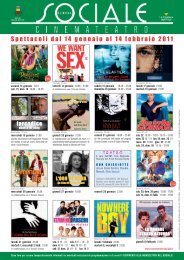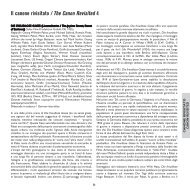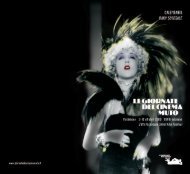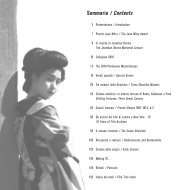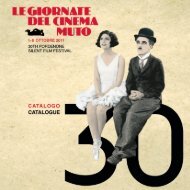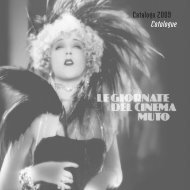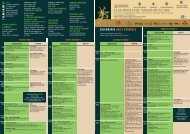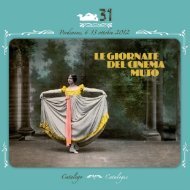Le Giornate del Cinema Muto 2005 Sommario / Contents
Le Giornate del Cinema Muto 2005 Sommario / Contents
Le Giornate del Cinema Muto 2005 Sommario / Contents
Create successful ePaper yourself
Turn your PDF publications into a flip-book with our unique Google optimized e-Paper software.
spessore atmosferico, quell’evidenza misteriosa e incombente che<br />
domina le inquadrature <strong>del</strong> cavallo di legno all’orizzonte, le scene di<br />
battaglia, l’uso cromatico dei profili architettotonici. Chi mai aveva<br />
saputo concentrare il senso <strong>del</strong>l’azione ritagliando sui contorni di<br />
un portale, in un miracoloso viraggio rosso fuoco, le figure dei<br />
protagonisti che piangono di fronte allo scempio <strong>del</strong>la loro città?<br />
Chi, infine, era mai riuscito a ricavare una tale profondità di campo<br />
da poche sagome disegnate? <strong>Le</strong> colonne d’Ilio, evidentemente false,<br />
erano pure vere nel loro inquadrare il movimento degli attori in uno<br />
spazio che conquistava, lentamente, la terza dimensione. L’intensità<br />
<strong>del</strong> senso prospettico in La caduta di Troia non ha cedimenti. La sua<br />
consistenza è palpabile tanto negli spazi <strong>del</strong>la reggia, ornati da leoni<br />
e zampilli d’acqua, quanto nelle immagini mitiche degli amori divini,<br />
consumati in una conchiglia dal profilo allusivo, che fluttua nell’etere<br />
in mezzo a una ghirlanda di putti danzanti.” (Paolo Cherchi Usai,<br />
Giovanni Pastrone, Firenze, La Nuova Italia, 1985)<br />
“The Fall of Troy brought world-wide fame to Itala Film. No one before<br />
had brought to the design of a film this atmospheric richness, this<br />
mysterious and brooding atmosphere which dominates the framing of the<br />
wooden horse on the horizon, the battle scenes, the chromatic use of the<br />
architectonic profiles. Who had ever succeeded in concentrating the<br />
significance of the action, silhouetting in the contours of a portal, in a<br />
miraculous fire-red tinting, the figures of the protagonists who weep before<br />
the destruction of their city? Who finally had ever succeeded in creating<br />
such a depth of field from a few painted profiles? The columns of Ilium,<br />
clearly false, were nevertheless true in their framing of the movement of<br />
the actors in a space, which conquered, gradually, the third dimension.The<br />
intensity of the perspective space in The Fall of Troy has not lost its<br />
impressiveness. Its consistency is palpable as much in the space of the<br />
palace, decorated with lions and fountains, as in the mythical images of<br />
the divine lovers, consumed in a shell of allusive form, which floats in the<br />
ether in the midst of a garland of dancing putti.” (Paolo Cherchi Usai,<br />
Giovanni Pastrone, Florence: La Nuova Italia, 1985)<br />
GIOVANNA DI BRAGANZA (Joanna of Braganza) (Itala<br />
Film,Torino, IT 1911)<br />
Re./dir: ?; cast: ?; lg. or./orig. l: 283 m.; 35mm, 131 m., 14’ (16 fps),<br />
Cineteca <strong>del</strong> Friuli, Cineteca di Bologna, <strong>Cinema</strong>teca Portuguesa -<br />
Museo do <strong>Cinema</strong>.<br />
Didascalie in portoghese / Portuguese intertitles.<br />
Il restauro è stato eseguito partendo da una copia nitrato con<br />
didascalie d’epoca Itala Film portoghesi conservata presso la<br />
<strong>Cinema</strong>teca Portuguesa di Lisbona e da una copia nitrato incompleta<br />
con didascalie d’epoca inglesi conservata presso l’Archive Film<br />
Agency. / The restoration has been made from two original period nitrate<br />
prints, one with contemporary Portuguese intertitles preserved at the<br />
<strong>Cinema</strong>teca Portuegesa, Lisbon, and the other, with contemporary English<br />
intertitles, preserved by the Archive Film Agency, London. – DAVIDE POZZI<br />
132<br />
“In Spagna, don José parte per il servizio militare, lasciando l’amante<br />
con il figlioletto che ha avuto da lei; ma non torna più.Vent’anni dopo<br />
il figlio di don José è diventato un giovanotto e si è fidanzato con<br />
Giovanna, figlia <strong>del</strong> comandante portoghese don Michele di Braganza,<br />
e parte con quest’ultimo per difendere Lisbona dagli spagnoli. Ma<br />
l’esercito portoghese è sconfitto, gli spagnoli si impadroniscono <strong>del</strong>la<br />
città; negli scontri don Michele rimane ucciso e il figlio don José deve<br />
portare la tragica notizia <strong>del</strong>la sua morte alla fidanzata. I due giovani<br />
entrano a far parte di un complotto che un gruppo di portoghesi<br />
ordisce per uccidere il nuovo viceré spagnolo: il compito di colpirlo<br />
con il pugnale tocca proprio al giovanotto; solo all’ultimo momento<br />
sua madre riconosce nel viceré il proprio antico amante e cerca di<br />
impedire il parricidio. Don José si salva, ma l’attentatore finisce in<br />
prigione e attende di venire giustiziato. Sua madre si reca allora da don<br />
José, per svelargli l’accaduto e per indurlo a salvare il figlio; ma<br />
Giovanna di Braganza, scoperta a sua volta la verità, rifiuta il proprio<br />
amore al figlio di colui che le ha ucciso il padre e che opprime la sua<br />
patria: con la morte nel cuore si ritira in convento.” (Lux, Napoli, n. 80,<br />
15 gennaio 1911)<br />
“In Spain, Don José goes off to his military service, leaving behind his lover<br />
and their little son, but he does not return.Twenty years later Don José’s son<br />
has grown to a young man, and is engaged to Giovanna, the daughter of the<br />
Portuguese Commandant Don Michele di Braganza. He leaves with Don<br />
Michele to defend Lisbon from the Spanish. But the Portuguese army is<br />
defeated, and the Spaniards take possession of the city. In the conflict Don<br />
Michele is mortally wounded and Don José’s son takes the tragic news of<br />
his death to his fiancée.The young couple enter into a plot with a group of<br />
Portuguese to murder the new Spanish viceroy.The job of stabbing him with<br />
a dagger falls to the young man, but at the last moment his mother<br />
recognizes in the viceroy her old lover, and attempts to prevent the<br />
parricide. Don José is saved, but the attempted assassin is thrown into<br />
prison to await judgement. His mother then goes to Don José to reveal to<br />
him what has happened and to persuade him to save their son, but<br />
Giovanna di Braganza, in her turn discovering the truth, refuses her love to<br />
the son of the man who killed her father and who oppresses her country:<br />
with death in her heart she enters a convent.” (Lux, Naples, no. 80, 15<br />
January 1911)<br />
“Dramma storico di pregio, con una realistica scena di battaglia.” /<br />
“An historical drama of merit, with a realistic battle scene.” (The<br />
Bioscope, London, 26 January 1911)<br />
TONTOLINI NON VUOL FARSI DERUBARE (Cines, Roma,<br />
IT 1911)<br />
Re./dir: ?; cast: Ferdinand Guillaume (Tontolini), <strong>Le</strong>a Giunchi (<strong>Le</strong>a),<br />
Giuseppe Gambar<strong>del</strong>la; lg. or./orig. l: 146 m.; 35mm, 86 m., 5’ (16 fps),<br />
Cineteca <strong>del</strong> Friuli, Cineteca di Bologna.<br />
Senza didascalie / No intertitles.



